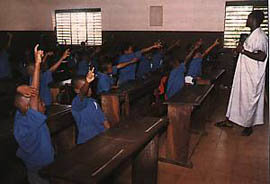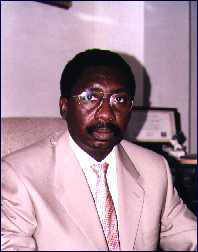 SOCIAL ISSUES SOCIAL ISSUES
 HEALTH, EDUCATION, POVERTY AND UNEMPLOYMENT HEALTH, EDUCATION, POVERTY AND UNEMPLOYMENT
With a 70% illiteracy rate and a life expectancy of 45 years, education and health are major concerns for the government. The World Bank together with international NGOs such as USAID have helped to set up programs to educate the population, especially women. This is no easy task, since French has only recently been awarded official language status, and major ethnic groups speak their own languages: Soussou, Pular and Malenke. Despite these difficulties, some progress has been made. In 1995 primary education covered 43%, as opposed to 29% in 1989. The objective for 1999 is 53%.

But probably the biggest challenge for Guinea is to step over the poverty threshold, particularly in rural areas. In 1995 the infant mortality rate was 136 per thousand, and 40% of its population live below the absolute poverty line (less than US$300 per person/year).
Unemployment affects officially 50% of the population, although the World Bank reduces this figure to 8-11% due to high employment in the informal sector. One of the reasons for the high unemployment rate is the closing up of inefficient state companies and the redundancy of thousands of civil servants. Unemployment is particularly strong among young graduates looking for their first job.
 THE ROLE OF SOCIAL SECURITY THE ROLE OF SOCIAL SECURITY

|
The CNSS (Caisse Nationale de la Sécurité Sociale) also plays an important role in the social development of Guinea. In 1985, 23 years after its inception, the Social Security system became entirely autonomous (under tutelage of the ministry of Social Affairs). The IWB (International Work Bureau) and the UNDP (UN Development Program) have guided the CNSS to restructure its finances, organization and collection system. Firstly the social security system stopped paying subsidies to numerous civil servants who did not contribute to its coffers. Secondly the social security code was updated widening its services to facilitate foreign companies to invest in Guinea.
Contributions from its 60.000 affiliates represent the only source of revenues. Despite initial reticence, contributions have been increased from 18% to 23%. CNSS General Director, Mr. Abdoul Karim Sylla, argues that this measure has allowed CNSS to face higher costs of life and to improve its services. Mr. Sylla’s most ambitious projects are the construction of a clinic for the workers and housing for the homeless.
 INTERNATIONAL ONGs HELP TO BUILD THE COUNTRY INTERNATIONAL ONGs HELP TO BUILD THE COUNTRY
Foreign aid is crucial to Guinea’s development since Guinea cannot afford to set up by itself many of the urgently needed programs: education, health, sustainable agriculture, or road construction. For example, according to Mr. Cellou Dalein Diallo, Minister of Public Works, the construction of 1 Km or road costs US$400.000, therefore US$40 million would be necessary to build a 100 km long road; in other words, 40% of Guinea’s national budget. The Republic of Guinea can only Contribute 10-15% of its budget to these projects.
International aid also helps to relieve foreign debt and to finance private investments, much needed in Guinea. Many of these donations come from multinational institutions such the World Bank, the International Monetary Fund, the European Union, the UNHCR (UN High Commissioner for Refugees) and the African Development Bank . But individual donor countries also contribute substantially to bilaterally established development programs. The Agence Française de Developpement supplies 50% of all bilateral aid. USAID 's 1997 budget for Guinea was US$14 million (half of that of 1994, when US$29.9 million was granted). Between 1994-96, the US helped construct 1.000 km of rural roads in Guinea. |

